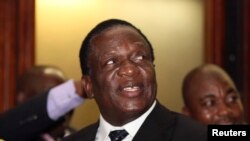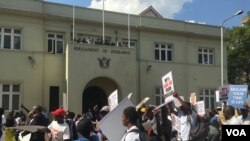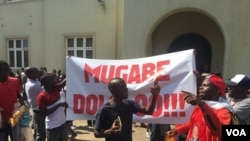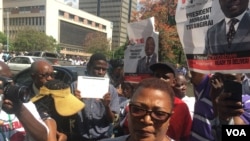For 37 years, Emmerson Mnangagwa was Robert Mugabe’s right-hand man and one of his staunchest defenders.
“Zanu-PF is a sacred party,” he told a crowd at a ZANU-PF rally earlier this year in central Zimbabwe. “It will rule and rule. Those barking will continue doing that while Zanu-PF remains in power. Forward with Mr Mugabe. Forward with Zanu-PF.”
What a difference a few months make. This month, deposed Vice President Emmerson Mnangagwa — nicknamed “the Crocodile” for his cunning guerrilla tactics in Zimbabwe’s independence war — led the effort to oust the longtime president and is expected to be sworn in as president Wednesday or Thursday following Mugabe's resignation.
“I told the President that the current political and constitutional crisis in the country is not a matter between him and myself but between the people of Zimbabwe and President Mugabe,” he said in a statement sent to journalists Tuesday. “The people of Zimbabwe have clearly spoken on this matter. To me the voice of the people is the voice of God and their lack of trust and confidence in the leadership of President Mugabe has been expressed.”
Last week, the military put Mugabe under house arrest, demanding Mnangagwa’s reinstatement and Mugabe’s resignation. The catalyst for that drastic move came earlier in the move, when Mugabe fired Mnangagwa — who is well-liked by the military — accusing him of treachery. The move was widely seen as an chance for Mugabe to fill the position with his unpopular, 52-year-old wife.
But Mnangagwa is no young buck. Since 1980, he’s served in a handful of cabinet positions, including as intelligence chief, and was made vice president in 2014 after Mugabe fell out with his predecessor, Joice Mujuru, now also a bitter Mugabe critic.
Mnangagwa’s investiture, in fact, would settle a bitter generational power struggle within the ruling party. One faction, of liberation-era fighters turned politicians, is led by Mnangagwa, who earned his nickname in 1965, the year Grace Mugabe was born. The other, the G40 faction, of younger Zimbabweans, was led by Grace and enjoyed privileged access to Mugabe.
Chris Mutsvangwa, head of the influential war veterans’ association, said they are supporting Mnangagwa. He blamed the nation’s spiraling economy on the poor leadership of the younger faction.
“They have no idea of how to run a modern state, so they’ve run a scorched-earth policy on the economy,” he said. “...But what we have done with my leadership of the war veterans … is to give back the people of Zimbabwe their conscience, because they look to the people who fought and liberated them for guidance. And when we then said there’s something wrong with this man and his wife, the team, the cabal called the G40.”
But is Mnangagwa a breath of fresh air? Zimbabwe scholars are quick to note he is widely credited with being the architect of Gukurahundi, a series of army-led massacres of political and ethnic rivals in the 1980s.
“In many ways he’s worse,” said David Moore of the University of Johannesburg, who noted that Mnangagwa’s actions were viewed internationally through the cynical lens of the Cold War, when the Communist-aligned African National Congress was flexing its muscle in Southern Africa and forging alliances with Mugabe’s rivals.
“Look, he planned, he did, a lot of Gukurahundi,” he told VOA. “And why was he allowed, why did he get away with, Gukurahundi? Because the British and everybody else was really, really worried about the ANC getting a foothold in Zimbabwe, and the ANC was aligned with ZAPU. And Margaret Thatcher and her friends of course thought the ANC was run by the SACP and Russia. So it was a good thing to crush ZAPU, for the West. … He was flavor of the month for a long while, and he might still well be.”
Mnangagwa has maintained a low profile since his firing. But his statement Tuesday, he criticizes the regime’s “corruption, incompetency, dereliction of duty and laziness, social and cultural decadency.”
But why only now? Perhaps Mnangagwa let his cards show in an interview two years ago with local media, in which he spoke proudly of his nickname, “the crocodile.”
“It never goes in the villages or in the bush looking for food,” he said. “It strikes at the appropriate time.”
Sebastian Mhofu in Harare contributed to this report.







